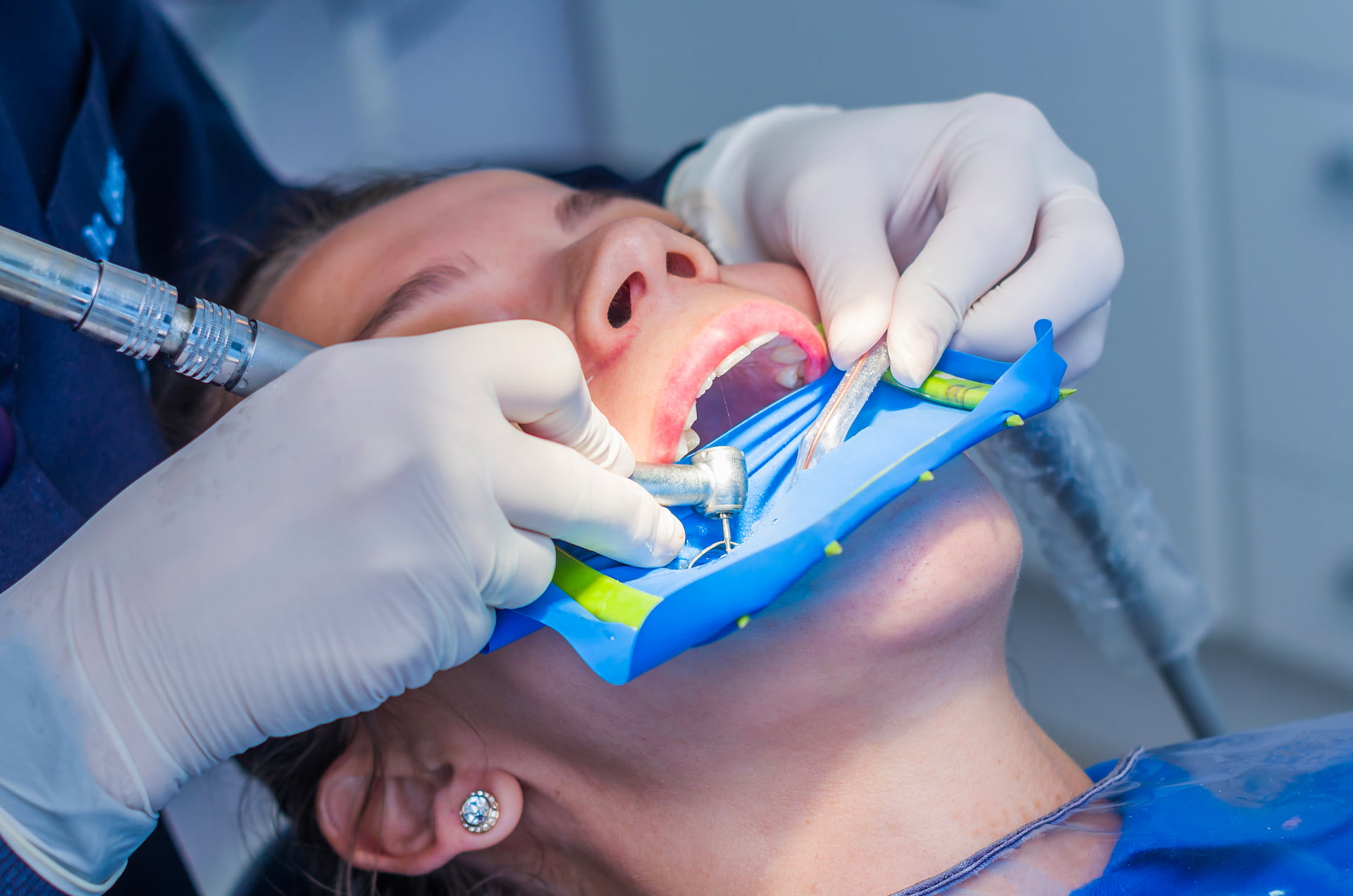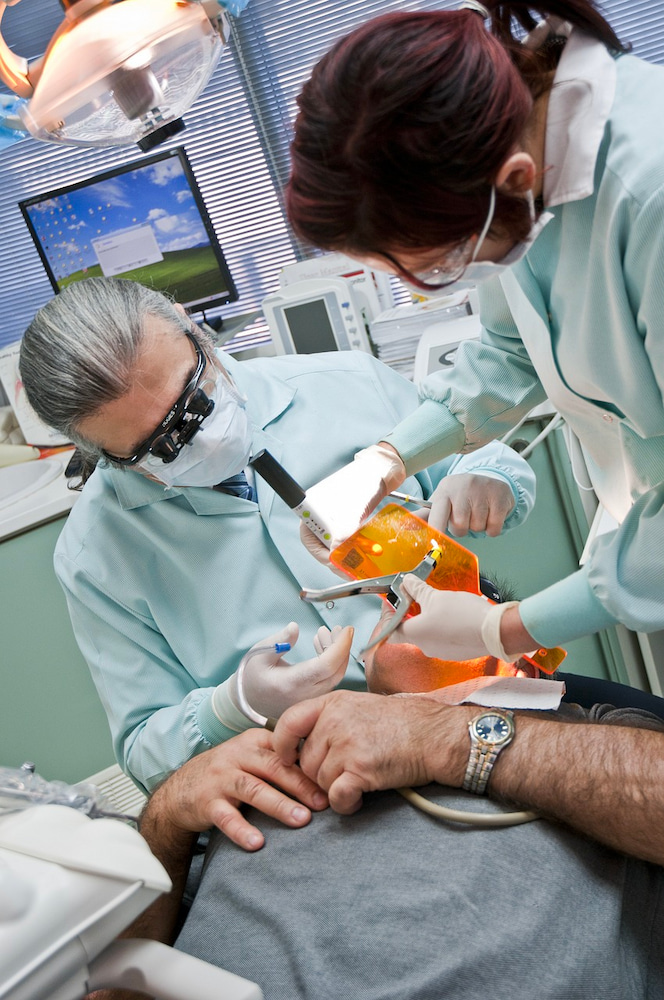Root Canal procedure

Examination & preparation
Before the root canal procedure, the dentist will examine the affected tooth, take x-rays, and administer a local anaesthetic – or in some cases a general anaesthetic – to numb the area. Once the tooth is numb, the dentist will place a dental dam, a small sheet of rubber or vinyl, around the tooth to keep it clean and dry during the procedure.

Remove the infected or damage pulp
The dentist will then make a small opening in the top of the tooth to access the infected pulp. Using special tools, the dentist will carefully remove the damaged or infected pulp from the tooth, clean the area thoroughly, and shape the root canals.

Filling the root canals
Once the root canals are cleaned and shaped, the dentist will fill them with a special material called gutta-percha, which is a rubber-like material that helps to seal the canals and prevent future infections.

Restoring the tooth
After the root canal is complete, the dentist will typically place a temporary filling or crown to protect the tooth while a permanent restoration, such as a crown, is fabricated and replaced at a later appointment.
Aftercare after a root canal
Take prescribed medications as directed by your Dentist
Your dentist may prescribe painkillers or antibiotics to manage pain and prevent infection. It is important to take these medications as directed to ensure a smooth recovery.
Avoid chewing on the treated tooth
After a root canal procedure, the tooth may be sensitive and tender. To promote healing and prevent further damage, avoid chewing on the treated tooth until your dentist advises you that it is safe to do so.
Practice good oral hygiene
Good oral hygiene is important for the success of the root canal treatment and the long-term health of your teeth and gums. Brush and floss regularly, and use an antiseptic mouthwash to help reduce the risk of infection. Additionally, make sure to attend all follow-up appointments with your dentist to ensure that the tooth is healing properly.

Root Canal Treatment
When a tooth is damaged badly or infected, a root canal treatment offers a way to restore its function without extracting the tooth. Also called an endodontic treatment or RCT for short.
Our dentists at the TLC Dentist Clinic provide non-surgical and surgical root canal treatment in Sydney to help our clients look after their oral health.
Book Appointment (02) 9558 0225
What is a Root Canal treatment (RCT)?
When a tooth is severely damaged, the dental pulp (containing nerves, blood vessels and tissue) at the core of the tooth is vulnerable to infection. This is as food debris and bacteria can get in through the cracks and into the tooth’s soft pulp when it’s not promptly repaired.
A dental root canal treatment is a critical procedure that removes damaged tissue and saves a decayed tooth without having to remove it completely. The procedure is performed over 2-3 visits.
In most cases, a root canal treatment involves:
- Drilling into the top of a tooth.
- Cleaning out the bacteria and dead nerves, blood vessels and tissue within the tooth’s soft pulp.
- The hollowed area will be filled and sealed with a temporary filling while you wait for the permanent crown.
- Fitting on a new dental crown onto the tooth.
In a root canal for an infected tooth, no anesthesia is needed for a painless treatment as the soft pulp inside will already be decayed.
There are several root canal treatment options available, depending on the state of the damaged tooth.
When it becomes critical to get a Root Canal Treatment
The common signs that your tooth might require treatment are:
- Darkening or discolouration (such as a tooth going grey or black)
- Long-lasting sensitivity when eating
- Spontaneous pain even when not eating or drinking
- Pain that wakes you up in the middle of the night
- Sensitivity to hot or cold temperatures
- Swelling or tenderness of the gums
- Chipped or cracked tooth
- A hard abscess or lesion on the gums
Deep decay
These signs alone may not mean your tooth is damaged enough to require a root canal treatment.
However, if you are experiencing any of these issues, it is important to get a checkup promptly to ensure that is not a sign of a larger problem and can be quickly addressed.
In a consultation, our dentists will inspect the condition of the damaged tooth with macro imaging, X-rays, and a physical inspection to give you a proper assessment. Depending on your condition, we’ll recommend the next step and type of treatment.
Types of Root Canal Treatment
The two types of root canal treatment differ depending on their suitability for the state of damage within the tooth, and the amount of work required to treat it.
Non-surgical root canal treatment
In a non-surgical root canal treatment (also called root canal therapy) the dentist performing the procedure will only need to drill a small hole in the tooth’s surface, through which they extract all the infected pulp. This may be a portion of or all of the pulp. Local anaesthesia will be used to numb the area around the tooth.
This dental treatment is called a pulpotomy root canal when only some (and not all) of the pulp needs to be extracted.
Surgical root canal treatment
Apicoectomy / Root End Surgery
In a root canal apicoectomy, the soft pulp and surrounding tissue (such as the root) in the tooth are accessed through a surgical incision in the gum. An apicoectomy may also be required if infection or inflammation has spread to the underlying bone.
Root Canal Treatment Aftercare
- After a root canal treatment, pain and discomfort should be minimal.
- Don’t chew or bite hard with the infected tooth, instead opt for softer foods.
- Your root canal dentist will write you a prescription for a suitable painkiller if needed to help you be comfortable.
- Brush your repaired tooth gently along with the rest of your teeth.
We’ll also schedule a follow-up appointment in about 2-3 weeks to check up on everything.
Root Canal Treatment Costs
Dental root canal treatments at TLC Dentist are roughly $###-### depending on the condition of the tooth and work needed.
We offer flexible payment plans to help make dental care more accessible.




